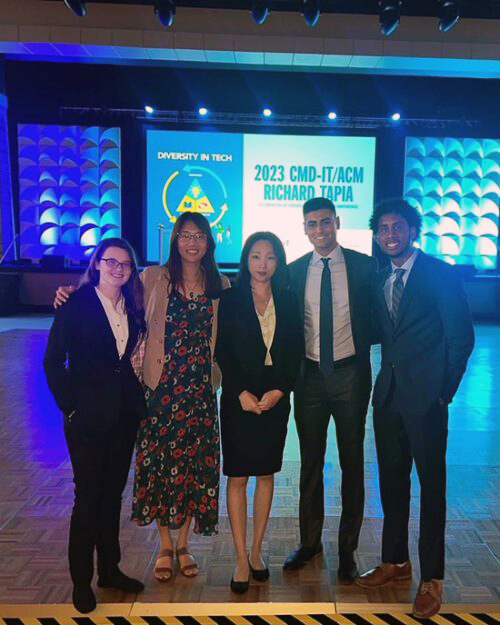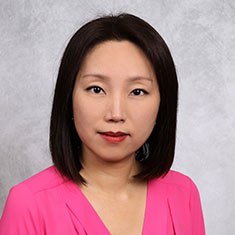STARS Computing Corps membership increases representation in computing disciplines

PNW STARS Computing Corps students have taken part in sponsored trips to the Tapia Conference, a premier gathering for students in computing disciplines and industry leaders. Pictured, from left, include Alyssa Gargano, second-year Computer Science major; Jay Chen, B.S. Computer Science ’23; Grace Yang, chair of PNW’s department of Computer Science; Julian Silva, B.S. Computer Science ’23; and Quin Owens, B.S. Computer Science ’23.
Grace Yang, chair of the department of Computer Science at Purdue University Northwest (PNW), remembers during her own education journey when she would sometimes be the only woman in a computing class with a majority of male students.
Although women students’ participation in computing and other STEM disciplines is slowly increasing, Yang says these students have confided in her as well about their occasional discomfort in a historically male-dominated field.
Yang has long supported students from historically underrepresented groups joining Computer Science and other computing disciplines, including through the establishment of a STARS Computing Corps chapter at PNW.
“When we welcome students into Computer Science, we want them to find a community where they belong,” said Yang. “The entire computing discipline is addressing underrepresentation from minority students, women, individuals from low-income backgrounds and individuals with disabilities. A multicultural cohort helps bring together different backgrounds, ideas and personal strengths. Having a diverse student group working together is not only important for our program, but it will benefit these students when they join a future workplace.”
A multicultural cohort helps bring together different backgrounds, ideas and personal strengths. Having a diverse student group working together is not only important for our program, but it will benefit these students when they join a future workplace.
Fostering student-to-student connections
The STARS Computing Corps is a national alliance sponsored by the National Science Foundation (NSF) that promotes participation, persistence and career advancement in computing disciplines for historically underrepresented populations. The initiative supports undergraduate and graduate students, as well as university faculty members.
PNW applied and formed a chapter in the fall of 2022. The formation was completed in tandem with a departmental Broadening Participation in Computing plan submitted to the NSF detailing how PNW would contribute to a discipline-wide mission for supporting diversity in computing. Grant funding from the STARS Corps and the Indiana Academy of Science additionally supports the chapter’s activities.
Yang has helped gather a diverse student membership that has built a support network for underrepresented students. The chapter’s peer mentoring program allows first and second-year students to be paired with upperclassmen to not only receive academic coursework help, but also develop friendships to share advice and build a sense of belonging.
“Sometimes students hesitate to talk to professors,” said Yang, “but they will often find it is easier to talk to their peers, especially someone from the same background.”
Alyssa Gargano, a second-year Computer Science major, stepped into the role of president of PNW’s STARS Computing Corps chapter during spring 2024, and serves as a peer mentor. She feels eager to create pathways for women students like her to find a welcoming community in computing disciplines.
“I was always interested in computers and seeing how you can turn little pieces of coding instruction into a product or final result,” said Gargano. “Seeing so many men in the industry can feel isolating as a woman. While many men may be willing to listen, they do not fully understand the challenges women face. I want to see people who are like me and support minority student groups to help their futures.
“I feel really grateful for Dr. Yang. Anytime I have questions, whether it be about STARS or my major, she is so supportive of me to achieve the things I want to.”
I want to see people who are like me and support minority student groups to help their futures.
Long-term goals
The Computer Science department’s Broadening Participation in Computing plan provides a comprehensive approach to increasing interest and enrollment for historically underrepresented students, as well as fostering student success in the program.
Several of these initiatives include: developing inclusive curriculum and teaching practices; coordinating outreach to local middle and high school students to encourage interest in computing disciplines; strengthening current pathway programs and transfer students; and collaborating with ongoing PNW Hispanic-Serving Institution initiatives.
Yang also aims to take Computer Science students annually to the Tapia Conference. The conference is produced by the National Center for Minorities and People with Disabilities in Information Technology, offering training sessions, workshops, research presentation opportunities and connections with academic and industry leaders. For the past two years, PNW Computer Science students have attended the conference thanks to sponsorship from the STARS Corps.
“The conference focused on amplifying voices of underrepresented groups with panels and opportunities to share personal experiences,” said Gargano. “It is helpful to hear other perspectives, the types of struggles other people go through and how people are improving the computing fields.”
